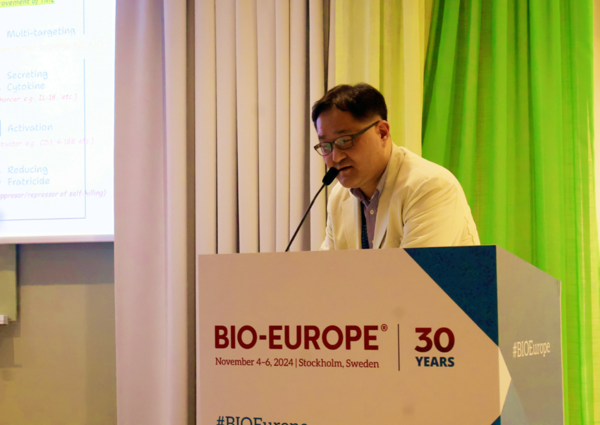Korean biotech company Eutilex unveiled its chimeric antigen receptor T cell (CAR-T) platform at BIO Europe 2024 in Stockholm on Monday.
The platform utilizes fourth-generation “Armored” CAR-T technology, designed to address the tumor microenvironment challenges unique to solid tumors, which present greater treatment barriers than blood cancers.

Eutilex’s fourth-generation technology includes enhancers, engagers, and multi-targeting mechanisms to enhance T-cell effectiveness against cancer cells. “The enhancer strengthens immune response, cytokine production, secretion, and activation within the tumor microenvironment, improving therapeutic efficacy for solid tumors,” an Eutilex official explained.
Unlike blood cancers, solid tumors are dense, mass-like structures that limit treatment penetration and have high cellular interaction, leading to continuous growth and fewer effective therapies for long-term survival.
The five-year relative survival rate for metastatic liver cancer is just 3.1 percent, with an overall rate of 39.3 percent when primary cancers are included, compared to 65.4 percent for non-Hodgkin’s lymphoma, a blood cancer.
In Korea, liver cancer impacts around 15,000 new patients annually—three times the incidence of non-Hodgkin’s lymphoma. While six CAR-T therapies have received U.S. FDA approval since 2017, all are for blood cancers, with none yet approved for solid tumors.
A Boston Consulting Group report from last March projected that over the next 10–20 years, drug research would focus on eight areas: solid tumors, blood cancers, immune diseases, cardiovascular diseases, infectious diseases, central nervous system disorders, respiratory diseases, and rare diseases. Among these, solid tumors are expected to dominate.
“Eutilex covers the full process from drug R&D to clinical trials and manufacturing, incorporating clinical sample analysis and preclinical testing to support CAR-T platform development and partnerships,” the Eutilex official said, adding that its CAR-T platform can shorten development time and reduce costs for companies targeting cancer but lacking CAR-T capabilities. A deep learning-based multi-omics analysis underway is also expected to improve patient segmentation and treatment efficacy.
“The era of CAR-T therapy for solid tumors is set to begin, and it will be a key focus for Eutilex’s business development,” added Lee Chong-soo, managing director at Eutilex.
Related articles
- Eutilex selected for state BioChallenger program to develop CAR-T therapy for liver cancer
- Korean biotech firms resort to desperate measures as listing grace periods expire
- Eutilex registers patent for antibody therapy in China
- Following the US, Korean regulator obligates monitoring of CAR-T cell therapies
- Eutilex advances veterinary immune boosters, cancer therapies
- Eutilex’s revenue surge driven more by IT acquisition than biotech growth

